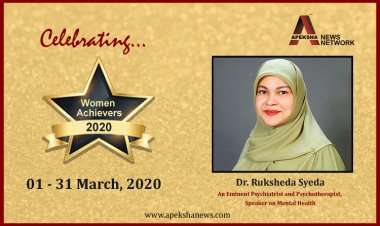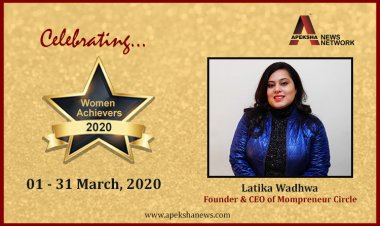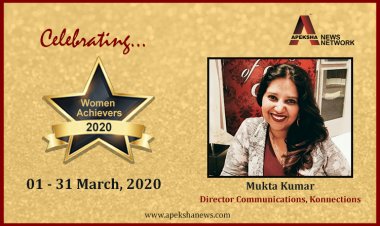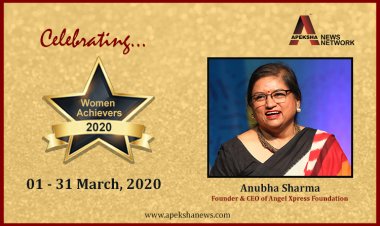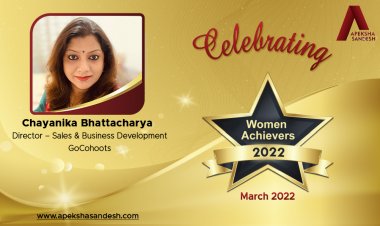“Government does have a lot of policies in place for women’s health” – Dr. Rajalaxmi Walavalkar Medical Director, Senior Gynecologist and IVF specialist
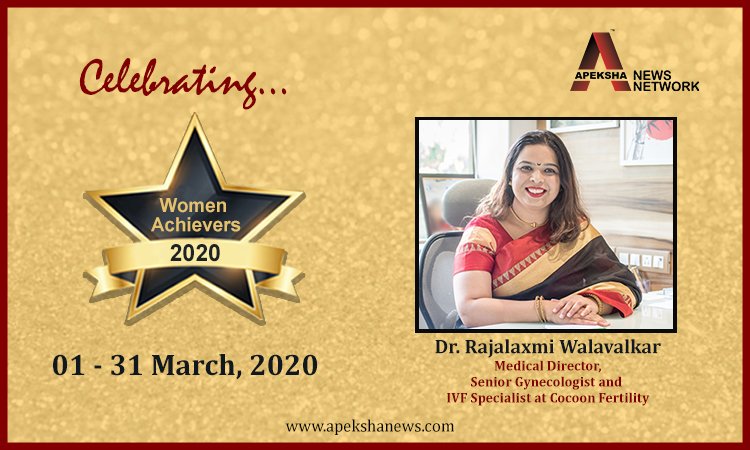
Dr. Rajalaxmi Walavalkar is a Medical Director, Senior Gynaecologist and IVF specialist at Cocoon Fertility, one of India's leading chains of IVF centres catering to infertility and related conditions. With an extensive experience in reproductive medicine, her career of academic distinction spans over 21 years.
Dr. Walavalkar has been invited as a speaker and have delivered talks at numerous regional, national and international conferences. She also holds the honour of being the Founder Chair of the RCOG-India Liaison group of the RCOG, UK and has previously served on the RCOG Congress Committee and the India Steering Group of the college, where she was involved with academic exchange between the two countries. She has many scientific papers and chapters in post graduate books to her credit. She was recently awarded the ‘Leading IVF Consultant Award’ at Times Power Women 2018 awards.
Dr. Walavalkar has been involved with various charities, free health check-up camps in rural Maharashtra, and the ‘CALMED’ program of International Rotary that aims towards reducing maternal mortality in India.
In this conversation, Dr. Rajalaxmi Walavalkar speaks with the team of Apeksha News Network on women’s health, child adoption, importance of sex education and much more!
How has been the journey so far for you as a Gynecologist and IVF specialist?
I come from a medical family where my mother was a medical teacher and my father in the pharmaceutical field. Medicine was always in the air while growing up, and yet while choosing my career, I was a little dissuaded from doing medicine typically because of the difficulty and long study hours associated with the course. My father began giving me different career options but as time passed, I decided to take up medicine as my career choice.
My journey towards selecting Gynaecology as a field also came in very early. During my first year of medicine, I was very sure that I wanted to become a surgeon. I loved anatomy and pathology as subjects and was truly inclined towards knowing the surgical aspects of any organ that I studied when I was a young doctor. Interestingly, when the results were out, I had performed excellently well in Ophthalmology and ENT. I went on to pursue Ophthalmology, however, chose Gynaecology later and have been extremely happy since then. I did my Post-Graduation in Mumbai and thereon travelled to England for pursuing MRCOG. I did my training in infertility and IVF including research training and high-risk obstetrics. However, when I studied infertility the fact that I could help couples achieve their dream of becoming parents left me with a certain amount of happiness, joy and satisfaction. This is how my journey in IVF began. I now work with my sister Dr. Anagha Karkhanis in Cocoon Fertility which is a leading chain of clinics in different cities of Maharashtra. We have 7 running centres and 5 more centres in the pipeline including an expansion in Africa.
Overall, my journey so far has been extremely satisfying on a personal, professional as well as at a social level.
How important is sex education in today’s era? And why?
Sex or wanting to have sex is a natural instinct for every human being. It is a fact of life that unfortunately people are not very comfortable talking about it. We know that in today’s times with exposure to various internet materials, movies, serials that are a little more vocal about sexuality, kids are understanding about sex and getting exposed to sexuality earlier in life. At such a point of time, there is a need for open communication so that they understand what it is. Otherwise, there can be curiosity which might make them experiment without having complete information and can cause problems in the long run.
Irrespective of the age at which one becomes sexually active, if proper care is not taken there is always a risk of developing STDs and unwanted pregnancies. The emotional turmoil that follows will be very severe for an adolescent who is trying to cope with his or her physiological changes, the sexual urges of his/her body and the repercussions of getting involved in a sexual activity. And picking up other bad habits like alcohol consumptions, smoking, drug use, etc. due to pressure. Hence, it is very important that sex education is inducted in the right fashion and in a safe and secure environment.
What is the biggest struggle of a woman today in India in terms of maintaining their health and stay fit?
Despite us living in the year 2020, this is still an era of inequality as far as health provision and access is concerned. Traditionally, we had a patriarchal society wherein women were only in charge of cooking and taking care of all the other household chores. Despite of these duties, the first person who gets fed is the man of the house and the last if anything is left can be taken by the woman. What we fail to understand is that she is the same woman who is going to carry the future children, and therefore if she is not healthy, the child that she bears will also not be healthy, physically strong or nutritionally competent. This might lead to having an unhealthy family chain ahead. So, I believe that nutrition is the biggest challenge because of which not only the overall health of the woman gets affected, but also the health of the future generation is at a major risk.
Secondly, I feel access to healthcare is not very prominent in our country till date. Women are not empowered enough to openly express about what they are suffering from. They usually tend to keep their aches and pains to themselves. It is highly observed that women don’t even ask for medical intervention or seek help and tend to keep on suffering, without realizing that their condition may become worse and difficult to treat. Somehow, we as a society also fail to understand that if a woman’s health is not been taken care of, it impacts the health and overall well-being of the entire family. It can further have a bigger impact on the overall health of the society as a whole. If we address the health issues of a much broader landscape, the demand of healthcare services in our nation will also increase, and in some way can also influence the budget on healthcare provided by the government.
Do you think the existing programs introduced by the government in terms of women healthcare needs enhancement? Any suggestions to the government?
It is a well-known medical fact that women are more pre-disposed to certain diseases as compared to men. So, certain chronic diseases like anaemia, heart disease, cancer, diabetes, depression and osteoporosis, all these tend to be higher in women than in men and also get diagnosed at a later stage. Therefore, the overall burden on the healthcare of the woman is higher.
Secondly, the penetration of healthcare services in smaller areas is very poor. Obviously, India is a very vast country, and therefore infiltrating to every small village or a hamlet is a bit challenging. Hopefully, with the newer schemes that the government is coming up with might address this over the years. But currently, access to healthcare is also becoming a very big problem.
Moreover, we do not have a national health policy like the national health service of the UK, and therefore people do end up keeping a budget for healthcare. Supposedly, if healthcare were free, then women might be more encouraged to come and seek help. But where there is money involved, there is going to be a problem accessing, like going to the doctor or buying medicines will be costlier.
Even in families where people are economically stable, where the woman has a secondary role like she might be a homemaker, shelling out finances would also be a problem. It is not only a problem of the lower socio-economic strata but also for the middle-class families or sometimes even in the higher-class women do tend to be given a secondary status when their needs and requirements and most importantly their health is concerned.
Government does have a lot of policies in place for women’s health. I feel it is only about getting them implemented rightly and if the government were to work with private partners, penetration of the services to the ground level and making sure there is uniformity around healthcare in the country might happen more easily.
Marriage, pregnancy, etc. everything has its own time and if it takes place at a right age, it is good for a woman. How far is it true?
A woman has the privilege of being able to carry a child and this is a privilege that the man unfortunately, does not have. But with the privilege also comes with the responsibility that she is the only person who is going to have the capacity to propagate future generations. So, if she decides not to have a child, there may not be a future generation. But in today’s times wherein women are equally educated and are doing well in their careers, this does put them in a dilemma of making choices between honouring their reproductive rights or her rights as a human being.
Unfortunately, the reproductive time for a woman is limited, so she can have children only between certain age groups. Biologically from the start of her period until the end of it, but medically it is advisable between the age of 24 to 35, since before and after this age frame, there are certain problems that can arise for their pregnancies. There is no right or wrong answer about whether she should do everything in her own time or do it at the right age.
Today, the technology has advanced to such an extent that there are fertility preservation options are available for a woman. Woman can create embryos that can be frozen, and she can come back and have a baby whenever she is able to. For this, she need not sacrifice her education or career.
For women who do not have a partner or a husband, they can opt for egg freezing and when they find the right guy, they can go ahead and have a child. Therefore, a woman can now have the best of both worlds and it would be very unfair to ask her to give up on her career to have a child or let go of her fertility rights and privilege of motherhood just because she has chosen to become something or follow her dream or career.
Adoption of a child in India is a very long process and many couples who have tried for it give a feedback that they find it very tiring. With so many children awaiting to have a new family, and so many couples willing to adopt a child, for so many reasons, do you think that the gap is huge? Do you have any suggestions to the government in making the process easy for both the parties?
The process of child adoption though is not easy but is not difficult too! Different people are going to have different expectations from the adoption process and experiences. It entirely depends on your approach towards adoption and your choices while wanting to adopt a child.
Adoption has been made more streamlined in India since CARA has been formed, which is the central adoption agency. Ever since the introduction of CARA, there is a central national list and, on this list, to-be parents need to apply and go on the waiting list and as the list climbs up, your name comes closer to adopting a child. People will typically find it difficult to get a child, as they restrict themselves to a certain age. If you say you want a child between the ages of 0 to 2 years, there are fewer children from that group for adoption but the number of couples demanding a kid in that age group is very high. This increases your waiting time and the procedure feels very tedious and difficult. For people who want to adopt but say that they would only adopt from a certain state, then your chances of getting a child from your choice and selection from just one or two states becomes more difficult. People who keep an all India option open finds it easier to adopt a child.
It is important for couples to give a proof that they are physically, mentally, emotionally, financially stable and that they do not have any life-threatening diseases. So basically, if you do not satisfy these basic criteria then it is going to be more difficult for you to get a child. Hence, the process is not really as bad as it used to be, people just find this a little traumatic. What the government can do to make it a little better is to have centres in each state to update the parents about the status of their adoption process.
Based on your own experience, what advice would you give to women considering pursuing a career as a Gynecologist?
The advice for budding gynaecologists is to follow your dream and keep your eyes open because a gynaecologist needs to be alert and hard-working. On the other hand, it is extremely satisfying that you are part of bringing a new life into this world and it gives you a sense of fulfilment as a doctor.
Is (gender) equality an important issue for you? Why?
Basically, gender equality has been a social issue not only in India but all around the world. But it takes an uglier form in India wherein the society considers the girl child to be an additional burden even before she is born. Even today, when a mother delivers a baby girl, it is considered to be a bad omen by many, and the mother has to face curses.
There should be equality in the distribution of power, financial independence, influencers, access to education, sharing responsibility for family and home, personal ambition and power. Every human being has the right to be free for intimidation and gender-based violence, but unfortunately, we don't see this today.
There are certain practices that are banned around the world like female genital mutilation. But one needs to understand when the boy has circumcision, it reduces the risk of penile cancer, whereas in girls if the private genital area is disfigured it makes impossible for her to have normal sex.
What main change would you like to see for young girls in the next generation?
The girl child is the future of the world, hence the stronger we make her, a better world we will be bestowed by. I would like to see girls becoming more independent, strong and great decision makers.
If you could give one piece of advice to your younger self, what would that be?
I would like to reply this question in the form of a poem that I have penned.
Believe you can achieve it, don’t ask me how?
The time for action is now.
Just focus, on your goal.
Be ready to toil, give it your soul.
Achievements are your’s and success will flow,
Get up and start again, it was just a temporary blow.
Don’t give a dime to those who waste your time,
Work hard to achieve happiness sublime.
You have it in you, don’t wallow in self-doubt,
Trod a little more and turn your luck around.
Don’t grow up too soon
Take time to admire the stars and the moon
Never be sacred to say your mind
Never forget to always be kind
Enjoy your time, unfortunately it doesn’t last
We do grow up and that too very fast
Everything happens for a reason, remember this
The disappointments, the hurts, let them remiss
Your time has come, it’s here and now,
In the future you have already done it, just don’t ask me how?
Apeksha News Network congratulates Dr. Rajalaxmi Walavalkar for her contribution and commitment towards the society with her medical services and helping people deal with previous failed IVF, male factor infertility and recurrent miscarriages. We wish her good luck for all her future endeavours!



